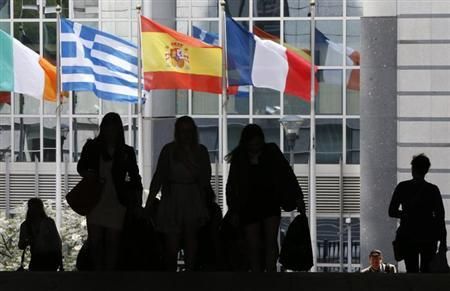The world economy is in worse shape than since the United States tremors initially rolled across the globe in 2008, says Ashoka Mody.

In December 2007, Professors Carmen Reinhart and Kenneth Rogoff compared the gathering subprime crisis in the United States to previous financial crises.
They predicted a severe economic crisis was imminent in the United States and that it would take about three years before the economic recovery started.
They proved to be remarkably accurate.
The recovery in the United States started in 2010 and, although tepid, it has persisted.
But there was no similar analysis for how the world economy would fare.
Although the world economy has become more interconnected, there has never been a framework to assess global prospects other than by just adding up country gross domestic products (GDPs).
In 2007, the global economy appeared extraordinarily healthy.
At about nine per cent a year, world trade had experienced unusually dynamic growth between 2004 and 2007.
The presumption was that the United States scare would have a temporary effect.
But more than six years later, the world economy is in worse shape than since the United States tremors initially rolled across the globe.
Japan is back in economic recession and the euro-zone economy is entering a new danger zone of debt-deflation dynamics.
The Chinese economy is slowing rapidly.
And after a brief upturn early this year, the Indian economy has slowed again. Using historical analysis similar to that of Professors Reinhart and Rogoff, Harvard professors Lant Pritchett and Larry Summers predict that China and India will continue to decelerate.
Brazil has ground to a halt.
So when world leaders met at the G20 summit in Brisbane, Australia, on November 14-15, some sense of urgency may have been expected.
Instead, they promised more "structural reforms" along with other assorted unspecified actions.
These, they inanely claimed, would deliver precisely 2.1 per cent more GDP by 2018.
If they believe that - or expect others to do so - they must live in a cognitive bubble.
The world economy refuses to restart for three reasons: bad policy, the fading of the United States as a global economic locomotive and deeply rooted development challenges faced by emerging markets.
The geopolitical tensions and the turmoil in oil markets only add to the risk of terrible outcomes.
The most serious policy failure has been in the euro zone, where the ill-conceived monetary union is saddled with a governance structure plagued by near-paralysis until it is threatened by imminent meltdown.
From annual growth of over two per cent between 2004 and 2007, the euro-zone GDP is down to growing less than one per cent a year since 2011 and its prospects are getting ever bleaker.
Italy is trapped in a cycle of falling prices and rising public debt burden; Spain and Portugal are on that threshold.
And yet at its latest meeting, the European Central Bank's governing council boldly promised more action, but only "if needed".
Fiscal policy remains contractionary in the most distressed economies, and there seems little appetite to close and merge weak banks.
In Japan, Prime Minister Shinzo Abe did finally take decisive action in December 2012.
But so fragile is the Japanese economy that one misstep - prematurely raising the value-added tax - has knocked it back into recession.
At the current pace, the Japanese economy is set to do worse than in its "lost decade". Today, the world has no global locomotive.
Between 2004 and 2007, the United States imports grew at six per cent a year; they have slowed down to a three-per-cent rate since 2011.
Put simply, without vigorous United States demand for world imports, other nations are unable to sustain their own momentum.
China briefly played the traditional United States role in 2010, but is slowing down rapidly.
Add to that the euro zone's stupor and the reasons for the collapse in global trade are clear.
World trade, which grew at a head nine per cent a year in the boom 2004-07 years, is now bumping along at just above a three-per-cent-a-year pace.
And with slower trade pulling down growth prospects everywhere, the world has moved to a new equilibrium of lower output and trade growth.
Emerging market growth was puffed up by the transmission of the United States bubble through world trade.
Now, the costs of those wasted years of fiscal populism in the major emerging economies are all too evident.
While some will continue to catch up with the advanced economies, even that is not assured for Brazil and others.
The new equilibrium also adds to global deflationary tendencies.
With Chinese producers' prices falling for nearly three years, the recent allegations of steel dumping by China are symptomatic.
As countries seek markets more aggressively, prices and wages will continue to be bid down.
For India, the recent decline in inflation may yet prove insufficient to compete globally.
This time last year my concern was that despite the cheerleading, especially in the euro area, "a sustainable global recovery may remain elusive, in which case 2014 could end in low gear as well".
The United States economic performance has been steady; everywhere else the prospects are much bleaker.
The extended and widespread weakness is breeding vulnerabilities and new crisis risks.
The concern now is not just about an elusive recovery but also about the real possibility of a shift in market confidence, reversal of capital flows from emerging economies and a debt-deflation spiral in the euro area.
The world leaders in Brisbane were evidently out of ideas.
They lacked a fundamental grasp of global growth dynamics.
But scarier still, they had no map to mount a defence against the next crisis.
Ashoka Mody is Charles and Marie Robertson visiting professor in international economic policy at the Woodrow Wilson School, Princeton University











 © 2025
© 2025